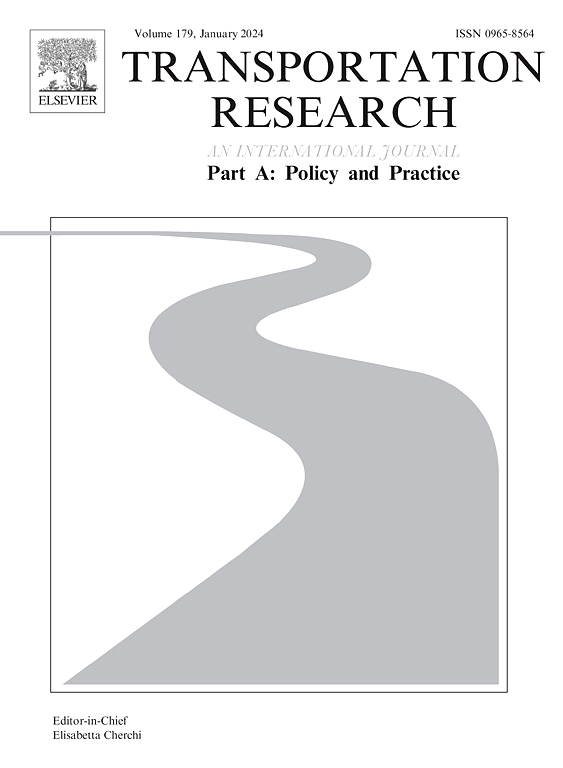Multi-Period operations optimization for passenger-freight shared transport: A game-theoretic approach
IF 6.8
1区 工程技术
Q1 ECONOMICS
Transportation Research Part A-Policy and Practice
Pub Date : 2025-07-12
DOI:10.1016/j.tra.2025.104601
引用次数: 0
Abstract
In the context of the sharing economy, passenger-freight shared transport emerges as an effective measure to enhance the utilization efficiency of transportation resources by leveraging excess bus capacity for freight transportation. This study considers a scenario where the intercity bus company (BC) can utilize its surplus capacity to transport freight for the logistics company (LC). We first characterize the interaction between their decisions using a sequential game model. Then, by employing a backward induction approach, we derive the optimal operational decisions for both the LC and BC for a given freight volume. Furthermore, we develop a multi-period optimization model to determine system-optimal freight volume allocation scheme for the LC and propose a tailored algorithm that yields near-optimal solutions. Additionally, we extend the basic model to investigate the impact of freight transport pricing authority on various stakeholders and evaluate the performance of different shared transport models. The results suggest that passenger-freight shared transport generally facilitates a win–win outcome between the LC and BC while reducing bus passenger waiting times. Additionally, multi-period coordinated decision-making contributes to enhancing overall system efficiency. Furthermore, when freight pricing is determined by the BC, it leads to higher freight volumes and more frequent bus departures, but may also result in increased ticket prices for passengers.
客货共享运输的多时段操作优化:博弈论方法
在共享经济的背景下,客货共享运输作为一种利用公交车过剩运力进行货物运输,提高交通资源利用效率的有效措施应运而生。本研究考虑了城际巴士公司(BC)可以利用其剩余能力为物流公司(LC)运输货物的场景。我们首先使用顺序博弈模型来描述他们的决策之间的相互作用。然后,通过采用逆向归纳方法,我们得出了给定货运量的LC和BC的最佳运营决策。此外,我们开发了一个多周期优化模型来确定LC的系统最优货运量分配方案,并提出了一个定制的算法来产生接近最优的解决方案。此外,我们扩展了基本模型来研究货运定价权限对不同利益相关者的影响,并评估了不同共享运输模式的绩效。结果表明,客货共享运输通常有助于LC和BC之间的双赢结果,同时减少巴士乘客等待时间。此外,多期协调决策有助于提高系统整体效率。此外,当运费定价由BC决定时,它会导致更高的货运量和更频繁的巴士发车,但也可能导致乘客票价上涨。
本文章由计算机程序翻译,如有差异,请以英文原文为准。
求助全文
约1分钟内获得全文
求助全文
来源期刊
CiteScore
13.20
自引率
7.80%
发文量
257
审稿时长
9.8 months
期刊介绍:
Transportation Research: Part A contains papers of general interest in all passenger and freight transportation modes: policy analysis, formulation and evaluation; planning; interaction with the political, socioeconomic and physical environment; design, management and evaluation of transportation systems. Topics are approached from any discipline or perspective: economics, engineering, sociology, psychology, etc. Case studies, survey and expository papers are included, as are articles which contribute to unification of the field, or to an understanding of the comparative aspects of different systems. Papers which assess the scope for technological innovation within a social or political framework are also published. The journal is international, and places equal emphasis on the problems of industrialized and non-industrialized regions.
Part A''s aims and scope are complementary to Transportation Research Part B: Methodological, Part C: Emerging Technologies and Part D: Transport and Environment. Part E: Logistics and Transportation Review. Part F: Traffic Psychology and Behaviour. The complete set forms the most cohesive and comprehensive reference of current research in transportation science.

 求助内容:
求助内容: 应助结果提醒方式:
应助结果提醒方式:


